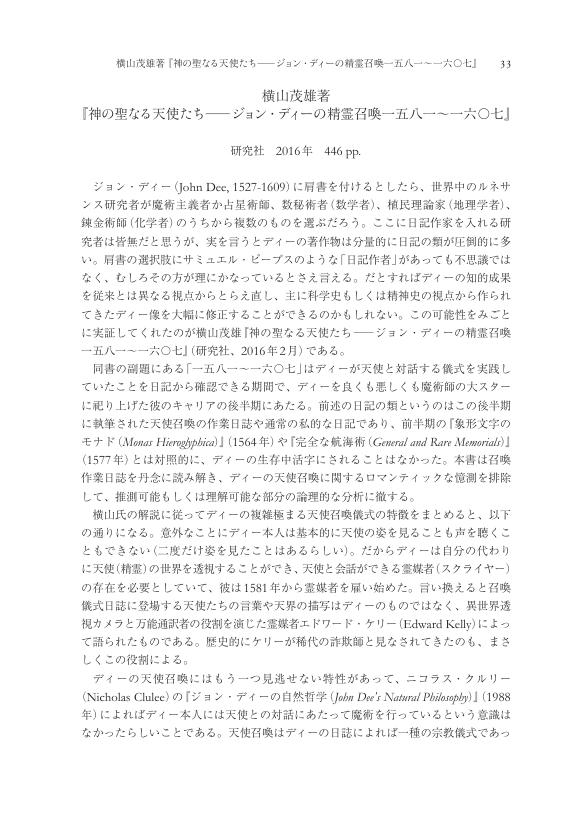7 0 0 0 OA 16世紀イングランド文学における浮浪者の表象研究
本研究は16世紀イングランド文学における浮浪者(vagabond)表象の分析である。本研究がこの社会集団に注目する理由は、16世紀の浮浪者が社会変化によって生みだされた近代最初の公的な貧困者たちであり、同時代のイングランド文学がこの集団に対して差別的イメージの原点となる負のステレオタイプを貼りつけたことにある。本研究は引籠りや離職者から、特定の外国人(ジプシーやアイルランド人など)、特定の職業(鋳掛屋や行商人など)まで一括して浮浪者と呼ばれた社会集団の表象において、16世紀イングランド文学が議会制定法、歴史書、パンフレットとの相互影響関係の中で特異なイメージを発達させた過程を歴史的に解明した。
4 0 0 0 IR シェイクスピア劇と売春産業─裏社会神話の誕生
- 著者
- 中野 春夫
- 雑誌
- 研究年報/学習院大学文学部 (ISSN:04331117)
- 巻号頁・発行日
- no.67, pp.105-126, 2021-03
1 0 0 0 OA シェイクスピア劇の小唄──デズデモーナとオフィーリアの怨み唄──
- 著者
- 中野 春夫
- 出版者
- 東北学院大学英語英文学研究所
- 雑誌
- 英語英文学研究所紀要 = Journal of Institute for Research in English Language and Literature (ISSN:03858855)
- 巻号頁・発行日
- no.47, pp.1-21, 2023-03-06
1 0 0 0 OA 『リチャード2世』、大衆劇場版の娯楽性
- 著者
- 中野 春夫 Haruo Nakano
- 出版者
- 學習院大學文學部
- 雑誌
- 研究年報 = The annual collection of essays and studies, Faculty of Letters (ISSN:04331117)
- 巻号頁・発行日
- no.68, pp.25-48, 2022-03-20
- 著者
- 中野 春夫
- 出版者
- 学習院大学文学部
- 雑誌
- 学習院大学文学部研究年報 (ISSN:04331117)
- 巻号頁・発行日
- no.60, pp.81-102, 2013
1 0 0 0 OA [書評]横山茂雄著『神の聖なる天使たち ― ジョン・ディーの精霊召喚一五八一~一六〇七』
- 著者
- 中野 春夫
- 出版者
- 一般財団法人 日本英文学会
- 雑誌
- 英文学研究 (ISSN:00393649)
- 巻号頁・発行日
- vol.94, pp.33, 2017 (Released:2019-05-08)
1 0 0 0 IR 浮浪者喜劇、『十二夜、あるいは皆様が望むもの』
- 著者
- 中野 春夫
- 出版者
- 学習院大学人文科学研究所
- 雑誌
- 人文 (ISSN:18817920)
- 巻号頁・発行日
- no.14, pp.79-95, 2015
近年の『十二夜』批評においてこの喜劇はしばしば「問題劇」あるいは「暗い喜劇」に分類され、アーデン第三版の編者は「とらえどころのない劇」とまで表現している。本論は『十二夜』をシェイクスピア時代の社会的コンテクストから分析し、この劇作品がもともとどのような喜劇であったかを指摘したい。『十二夜』を上演する娯楽産業の従事者たち、『十二夜』を描いた当の劇作家、そして1602 年頃の平日昼間にグローブ座で『十二夜』を観劇していた観客たちの多くが浮浪者と認定されかねないグレーゾーンで暮らしていた。本論は『十二夜』の登場人物たちが同時代の観客の同化を促すよう浮浪者のイメージと重なりあうように作り上げられ、劇中の小唄でも浮浪者の不安が語られる現象を指摘する。 Recent Shakespeare criticism has often mentioned Twelfth Night, or What You Will as 'a problem play', 'a dark comedy', or even 'an elusive play'. This paper aims to clarify the essence of the play as an Elizabethan comedy, focusing on its own social context. English society in the 16th century produced a potentially criminal minority technically termed vagabonds or rogues through a series of so-called Poor Laws. Being what were called 'common players', Shakespeare in his 'masterless' Stratford-upon-Avon years, his players, and the audience crowded in the Globe theatre who just moved into the metropolis for regular employment lived under the legal pressure of being branded vagabonds. This paper will illustrate that the main characters of the play were molded from stock images of vagabonds so as to allow audience to identity with and feel sympathy for them.
1 0 0 0 OA 浮浪者喜劇、『十二夜、あるいは皆様が望むもの』
- 著者
- 中野 春夫
- 雑誌
- 人文 (ISSN:18817920)
- 巻号頁・発行日
- no.14, pp.79-95, 2016-03-01
近年の『十二夜』批評においてこの喜劇はしばしば「問題劇」あるいは「暗い喜劇」に分類され、アーデン第三版の編者は「とらえどころのない劇」とまで表現している。本論は『十二夜』をシェイクスピア時代の社会的コンテクストから分析し、この劇作品がもともとどのような喜劇であったかを指摘したい。『十二夜』を上演する娯楽産業の従事者たち、『十二夜』を描いた当の劇作家、そして1602 年頃の平日昼間にグローブ座で『十二夜』を観劇していた観客たちの多くが浮浪者と認定されかねないグレーゾーンで暮らしていた。本論は『十二夜』の登場人物たちが同時代の観客の同化を促すよう浮浪者のイメージと重なりあうように作り上げられ、劇中の小唄でも浮浪者の不安が語られる現象を指摘する。 Recent Shakespeare criticism has often mentioned Twelfth Night, or What You Will as ‘a problem play’, ‘a dark comedy’, or even ‘an elusive play’. This paper aims to clarify the essence of the play as an Elizabethan comedy, focusing on its own social context. English society in the 16th century produced a potentially criminal minority technically termed vagabonds or rogues through a series of so-called Poor Laws. Being what were called ‘common players’, Shakespeare in his ‘masterless’ Stratford-upon-Avon years, his players, and the audience crowded in the Globe theatre who just moved into the metropolis for regular employment lived under the legal pressure of being branded vagabonds. This paper will illustrate that the main characters of the play were molded from stock images of vagabonds so as to allow audience to identity with and feel sympathy for them.
1 0 0 0 英国ルネサンス文学における魔術主義的想像力について
本研究は平成9年度から11年度にかけて、ルネサンス文学における魔術主義的想像力の特筆を分析、考察した。本研究はまず英国ルネサンス文学における魔術の扱われ方を考察した。この考察を通じて、「魔術」に潜む秘めやかな欲望、願望、空想を突きとめることができ、その現象を具体的に指摘した。その成果は『エリザベス朝演劇の誕生』(水声社)における「ルネサンス魔術のメタモルフォシス」(平成9年)に発表された。ルネサンス期において通常魔術と呼ばれたもの(自然魔術、星界魔術、天空魔術)は、霊(スピリトゥス、オカルト、プロパティー)という謎の作用力を対象とする点で錬金術と同じである。ところが、錬金術において霊を物質と単一化(現代の用語なら融合)させることが最終目的である一方、その他の魔術のおいては霊を物質の中に貯えるか、支配することが目標となる。護符(タリスマン)や悪魔召還がその典型的な例である。以上の成果は、『逸脱の系譜』(研究社)における「ルネサンス錬金術の想像力」(平成11年)に発表された。ルネサンス魔術は発想の点で現代の応用科学とそう変わりはない。いずれも(電磁力、原子力など)目に見えない作用力を応用しようと試みる点である。一方、違いも大きい。現代であれば物質的な因果関係から理解することを、ルネサンス期には霊的な存在を原因と考えたことである。必然的にルネサンス期の物理学、化学、天文学は空想的な仮説を生み出したこれが同時代の文学にしばしば応用された魔術主義的想像力である。
